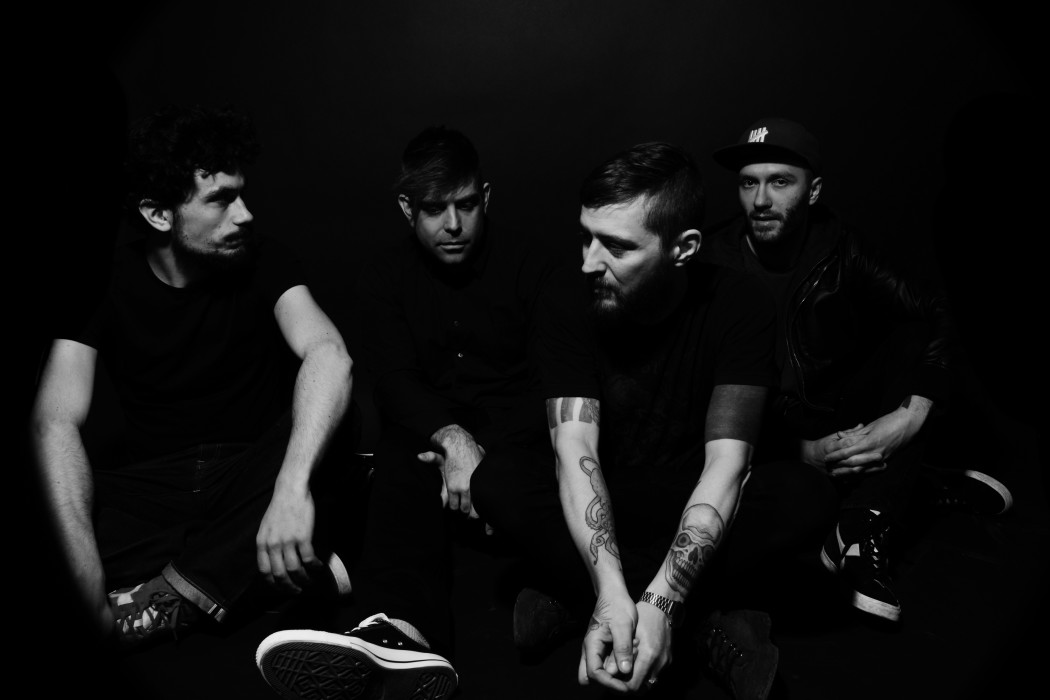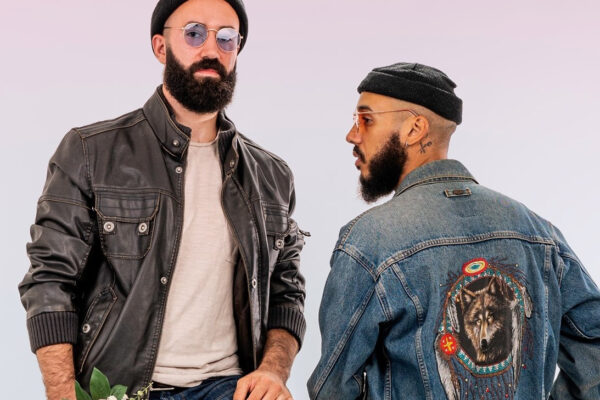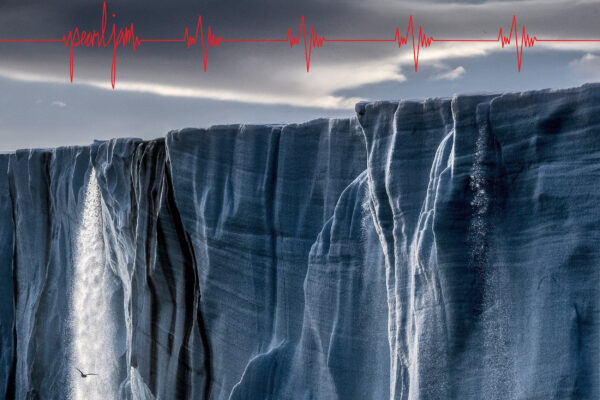With all the brilliant and talented rock bands in the Brooklyn and Lower Manhattan music scene, it’s easy to forget that there are countless talented artists who are shining their own lights outside of the guitar scene. After all this is New York! The cultural blending pot of the world, where people from all over come to add their own talents and dreams to a city always looking for something new and exciting. That’s exactly what electronic masterminds Late Guest (at the Party) have done. Three members of the group came to New York City from Italy in 2011. Almost right away they teamed up with singer/performer/producer Caleb Shreve, who has worked with notable artists including Yoko Ono, Wu-Tang Clan, and Tegan & Sara just to name a few, in hopes of following up their successful debut LP, which drew rave reviews from Radio BBC and Rolling Stone.
I met up with Caleb and drummer Renzo at my favorite whiskey bar in Brooklyn, The Gibson. We talked to them about coming to America, the marathon that was working on their upcoming album, Repeater, which is set for a July 15th release, and if there’s still art in music these days.
P&W: Was making an album here in the States the sole purpose of coming over here?
Renzo: That was always our dream. To move to where there was a strong music market. In reality, Italy doesn’t have any indie market to do your own music, unless it’s super mainstream. Don’t get me wrong, there’s plenty of great music in Italy, there’s just not a very effective way of getting the music out there.
P&W: What was the big deciding factor on wanting to bring Caleb on board?
Caleb: Well they originally had another singer. Actually the first record I produced with them was with the old singer. He ended up leaving which lead to them reaching out to me. It just made sense really, the fact that I was so familiar with their music and they were fans of records I had done in the past so it all worked out beautifully.
P&W: Was the goal all along to produce it yourself or did it just end up working out like that?
Caleb: Actually I co-produced it with a friend of mine Josh. He was one of my engineers that I’ve worked with for a long time and I felt like it would be hard to producer, perform, and write by myself. After we had kind of written the record I was hoping to bring in someone to help see things in a different angle. In the end it worked out us doing a lot of things together but Josh did a ton on the production side.
P&W: And do you feel Josh really stepped up and brought something to the table?
Caleb: Regardless of his skills versus mine, I think just having him there was great help. He’s a great musician and I think more musically trained than any of us are. We’re more electronic based and he’s got more experience playing guitar live so I think having him there with us being the only guy in the studio with a guitar in his hand while trying to help discover the tonality of a song idea, it was a huge help.
P&W: What are some acts that you really listened to growing up that you feel really had an influence on music that is on this album?
Caleb: I was a huge Blur fan growing up and these guys are huge Blur fans. Actually I think we sat around and listened to every Blur album at some point throughout the recording of this record and really thought about how those songs kind of transitioned into the Gorillaz, who are a big influence on us too, and a little more of our style.
Renzo: Definitely have to throw some LCD Soundsystem in there as well!
Caleb: Oh yeah of course. But you know I think there’s a little bit of punk in us too. We want rock and have a lot of fun and yell, and that’s LCD Soundsystem to me.
P&W: ‘Gravel’ and ‘Rockstars’ Daughters Have The Best Drugs’ are the first two singles from the album, do you think those two songs are some of the best material you’ve put out as a group so far?
Caleb: I definitely don’t think we’ve peaked with those by any means. ‘Rockstars’ Daughters’ was a more tongue-in-cheek song, and a transitional song for me. I wrote it with a friend and it was a reference to my past and also kind of a brought light-heartedness to our songs. I think that was our first release because it would make sense to people and be fun to listen to. It just seemed like a good introduction to what we wanted to say, as opposed to ‘Gravel’, which is almost the exact opposite. We wanted to show our depth and ability to what we could to with a more intense and melody-driven song.
Renzo: Those two songs were on total opposite sides of the record. ‘Gravel’ has much more pop melodies and they both really balance styles which works out perfectly.
P&W: What about the album as a whole?
Caleb: The album as a whole is really a snapshot of where we’ve been for the past two years. It’s a snapshot of the process of me joining the band to making the record. It has every moment of that journey, kind of like two years of trial and error. This album is less of a snapshot and more of a story of what we’ve been through the past two years.
Renzo: I can say that where we are now is not the same as where we were at when we first started writing and recording.
Caleb: I think we had to get through this record just to lay down the foundation and see who we are as a band. And we’re already well into writing for the next record, and we can already tell it’s going to be a different type of outcome or snapshot if you will.
P&W: How long did this album take to write?
Caleb: I think almost a year and a half. It was a couple months of us working together, then I kind of took off for two or three months and wrote a bunch of songs with some other people, and kind of withdrew a little bit. Then I came back and showed them all the songs I had written and then the actual tracking started, but that’s the easier part.
P&W: Now with your style of music- electronic music, do you feel that it doesn’t really catch momentum or come alive until the music is played in a live setting?
Caleb: I mean yes and no. There’s a certain energy and moment when the song is tight in the studio that let’s me know the song has taken a lift of its own, and that’s a moment that you can’t really re-create live because live performance is so in-the-moment. You’re there with the crowd and whatever happens happens. At the same time though, writing and recording the record is fun, then at a certain point we play the songs live and realize there’s a new energy to each song that didn’t exist in the studio. I feel both though, there’s a side where the music comes alive to me in the studio and there’s another side where the music comes a live in a performance setting.
Renzo: To me, the first time I listened to the finished record I thought ‘Okay, it’s not what I was expecting drum-wise’ and I liked that. It was very unexpected and exciting. It’s two different aspects though- one side is here is the actual record and then there’s the songs played live, where there is no control and the crowd can give you something totally unexpected that brings the song to new life.
Caleb: That’s what I like about this band though. You go see some electronic bands play live and it almost just sounds like a playback of the album, but we are a totally different animal live than we are on record. It’s much more of an experience than just listening in your headphones.
P&W: Specifically with electronic music, do you think it’s going to get to the point soon where artists won’t be needing labels anymore?
Caleb: I don’t think there will ever be a specific point. I just think there will be labels that can keep up with the times and adapting their business model to helping artists move forward in their career, than just specifically putting out albums. In the mean time there will always be indie artists doing it themselves. There will always be the big labels that control the radio and big agencies that dominate the touring circuit, but so many bands have gone viral other than the traditional music business model that it’s proof that labels aren’t a necessity anymore. In my experience labels have always slowed artists down from doing what they want to do. I think that the more successful artists are the ones that go and go full throttle. Maybe it’d be better for us to do that and do what we want.
P&W: Yeah I mean you see with Beyonce or Wolfmother, artists who are using the release itself and it’s own organic marketing campaign. That almost makes an artist with a strong following like those two not even need label support because the sudden release of a new album it its own best marketing plan.
Caleb: Yeah and now with all the blogs, there doesn’t NEED to be so much stress on a 2-month publicity or marketing campaign. We can just do a new song, send it to a popular blog and they can release it that day if we want. Technology has helped musicians in so many more ways than just retail, but marketing as a whole.
Renzo: It’s definitely a growing process. Big artists are showing people how the idea can work.
P&W: What do you want fans to take away from listening to this album?
Caleb: You know we’ve never really thought about that. We called the album Repeater because it’s about communication and about us trying to send signals out and having other people pick them up. I was talking to someone the other day about bringing art back to music. The Wu-Tang Clan made a single copy of their new album, and the idea was that they wanted to show that music was still art and valuable. So they’re going to auction off that single copy of the record to prove that. I think I would like people to realize that similar idea of music being an art form and it’s about us communication our ideas to our fans and not just something ambient to put in the background as a soundtrack to their party. There is still some art left if music.
Renzo: I too want to be able to say I made this music for myself, as an artistic expression. It’s a process that finally arriving to the end was the peak of this record for me. Getting to the end is what I wanted to do, like a marathon. Arriving to the end IS our art.
Article by Tom Shackleford




